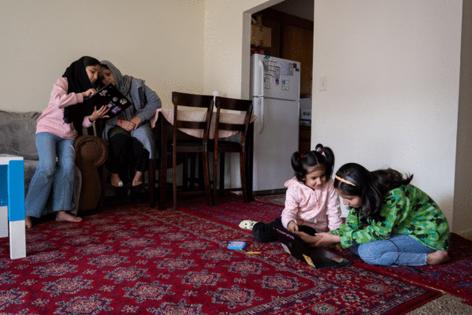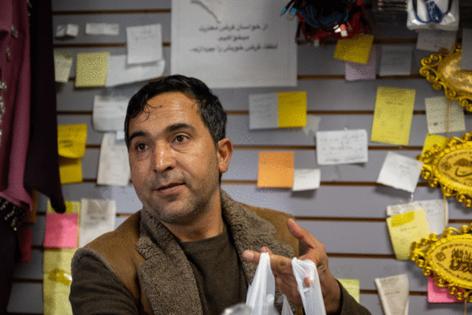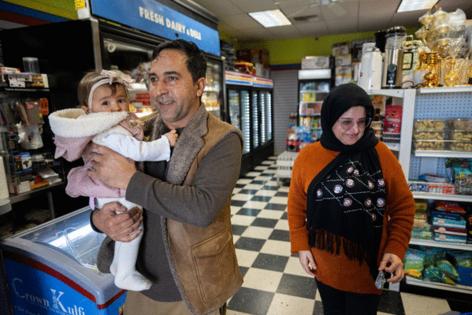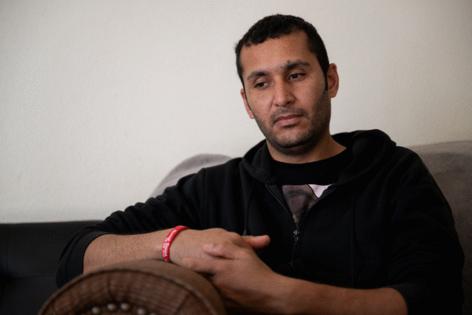Trump ban puts these Afghan refugees in limbo. 'This is an incredibly difficult time'
Published in Lifestyles
SACRAMENTO, Calif. -- More than once he awoke in his Yuba City, California, apartment with a feeling of relief, followed by one of sadness.
Although thankful to have made it to the U.S., the thought of other Afghans who remain in limbo, including ones he worked with in Afghanistan, saddened him. He said they, like him, had been admitted as refugees and were awaiting travel to the U.S., a wait that’s now indefinite.
This newly arrived refugee, whose identity is withheld for fear of retribution from the Taliban, entered the U.S. less than one week before President Donald J. Trump signed an executive order suspending the U.S. Refugee Admissions Program. He and his family arrived with a P-2 visa granted through the program that is now suspended, after spending about two and a half years in Pakistan going through the lengthy vetting process that’s served as a legal pathway to citizenship since 1980.
“I was really shocked,” he said through his relative, who translated. “Even in the nighttime when I wake up, I feel that, what if I was in Pakistan instead and Trump signed this order. I would have been in Afghanistan and I would have been killed by Taliban. ”
He joined his relative, who was granted anonymity for the same reason, in Yuba City, where their two families are part of a growing population of Afghans in the relatively small Northern California town.
Some local officials and residents had already begun raising questions about an expected rise in Afghan refugees who resettled in Sutter County this year, and how that would affect the cash-strapped county. But the complexion of that local issue has since changed along with the federal administration.
Refugees in limbo
Executive orders signed by Trump upon returning to office in January suspended the U.S. Refugee Admissions Program and paused funding directed toward agencies that help newly arrived refugees resettle in the U.S.
The immediate aftermath, clarified in an email from the state department, resulted in canceled travel plans for more than 1,600 who, through processes established after the U.S. withdrew from Afghanistan in 2021, are among a group of more than 10,000 refugees who completed the admission process and had planned to travel in the coming weeks, according to various media reports.
The suspension does not directly apply to special immigrant visas, designated for Afghans who worked directly with the U.S. military or adjacent contractors in Afghanistan. However, others who may have been connected to or supported the U.S. in Afghanistan often rely on the P-1 and P-2 refugee visas, which require a referral and have now been suspended.
Meanwhile, those holding special immigrant visas have still struggled to finalize their path to the U.S., as evidenced by the canceled travel plans for 83 Afghans, with a mix of refugee and special immigrant visas, who had been expected by the end of February by Opening Doors, a Sacramento area resettlement agency.
“All of the folks who we expected to welcome, both refugees and SIVs, have had their flights canceled,” said Jessie Mabry, the agency’s chief executive.
Another executive order freezing foreign aid caused a related wave of consequences for Afghans amid the refugee process overseas and newly arrived refugees during their first 90 days in the states.
The state department subsequently halted funds granted to resettlement agencies to help refugees — including Afghans with special immigrant visas — rent and furnish apartments, register their children in school and otherwise settle into their new lives.
“It’s wreaking havoc on the entire immigrant-refugee community and all the organizations that support them,” said an official with another Northern California resettlement agency.
Exact numbers are unclear, but 40,000 to 60,000 Afghan refugee cases may have been frozen due to the executive order, Shawn VanDiver, president of #AfghanEvac, said on X, including the estimated 10,000 Afghans who had been fully vetted and were awaiting travel plans.
Refugee resettlement groups, nonprofits and advocates, including some veterans groups, have pushed back against the suspension, which they said creates further uncertainty, financial strain and danger for displaced families, many of whom fear Taliban retribution because of their support for the U.S.
“Across the community, that includes Afghans, but not just Afghans — Ukrainians, Venezuelans, all sorts of different community groups — people are anxious,” Mabry said. “They’re nervous, they’re scared, they’re worried. They’re wondering if they will be able to ever see their loved ones again … This is an incredibly difficult time.”
Small town presence
Dozens of concise notes dot the wall behind the check-out counter of Noble Halal Market in Yuba City.
Each has a name and dollar amount, and some have a phone number, too. That’s the honor system Mohammad Marouf Sharifi uses to keep track of the small debts that accrue when his customers are short on money, particularly toward the end of the month.
“I’m glad that 95% are reliable. Only 5% are not reliable, but I take that risk, because I was in a bad situation before, and I know it’s hard to provide,” he said. “Especially to people coming to a new country, it’s hard to get everything, and especially it’s hard to get a good job. I understand that.”
Exactly how many Afghans have settled in the Sutter County area is unclear, but the presence of Sharifi’s store, and another Afghan grocery store in nearby Live Oak, are indicators of the growing population. Sharifi, who was an interpreter for the U.S. military, opened his store in 2018, a few years after moving with his family to Sacramento on special immigrant visas. The store in Live Oak opened later.
The refugee process, or the topic of entering the country, now comes up among customers almost every day, he said, which was not the case a month ago.
Prior to Trump’s inauguration, California Department of Social Services, which oversees resettlement agencies, had prepared Sutter County officials to receive up to 145 new refugees through 2025, said Sarah Eberhardt-Rios, county health and human services director.
That number was negotiated down from 500 new arrivals, which had surprised some members of the rural community. They had heard conflicting comments in November by two Yuba City council members about the incoming refugees coinciding with rumors in the area.
“All of our concerns and fears have really been relieved, more or less,” said Yuba City Mayor Dave Shaw in December.
In response to the initial refugee estimate, Sutter County Supervisor Mike Ziegenmeyer signed a letter to then-President Joseph R. Biden Jr., asking to reconsider state and federal policies due to how they could affect small rural counties.
“We lack the resources, infrastructure, and revenue to support high numbers of refugees and immigrants,” Ziegenmeyer’s letter reads, citing what’s already a lack of support for county residents.
Budget issues have mired the county recently, and were not helped when voters rejected a 1% sales tax within Yuba City, of which a portion would have been shared with the county.
The influx of refugees raised concerns, from how school districts would cope to whether the area had enough housing. After telling stakeholders that the community wasn’t equipped to absorb that many refugees in one year, the lower number was assigned by the state department of social services, local officials said.
“This resettlement process is really designed to take that feedback and try to best serve those refugees who are being settled,” Eberhardt-Rios said.
At the local level, resettlement groups — often nonprofits that contract with national resettlement agencies — help refugees and special immigrant visa holders during their first 90 days in the country, which includes renting and furnishing an apartment and helping them find work, schooling and English classes.
The state department’s stop-work order affects resettlement agencies, but some have continued to provide services for those who had already arrived and are within their 90-day window.
“There is a lot of anxiety and worry in the groups that we serve, so that is a factor,” said Mabry, director of Opening Doors, which has a satellite office in Yuba City. “But our services will continue.”
The county’s health and human services department processes applications for the Refugee Cash Assistance program, a state program that’s federally funded and offers up to 12 months of financial help to newly arrived refugees.
Sutter County enrolled 105 people in fiscal year 2024 for the cash assistance program, and enrollment has increased each of the past several years, from about 20 to 25 people the county processed in 2019, Eberhardt-Rios said.
Through the program, the county also administers other employment and social services to help refugees establish themselves.
How Trump’s executive orders may affect funding for those services and refugee resettlement remains unclear.
“Right now that is the question of the day,” Eberhardt-Rios said. “What are the funding impacts?”
“Everybody is still assessing what the impacts are,” she added.
A highly vetted process
Abdul Basir Ahmadi, 37, arrived in Yuba City with his wife, Marzia, and four school-age daughters in April.
He’s worked mostly as a cook since he was a teenager, he said, often for U.S. contractors, which helped him enter the U.S. through a special immigrant visa after the Taliban retook control of Afghanistan. With the Taliban back in control, Ahmadi said his U.S. connections caused him trouble back home, which he feared would escalate in time.
“Because of that, we need to save our family,” he said. “Because of that, we came here.”
Since beginning in 1980, the federal refugee program has offered a highly vetted form of entry and pathway to citizenship for those who, oftentimes, are displaced from their homelands and facing a threat of harm were they to return.
Applicants undergo a lengthy screening process that may take several years and includes background checks, interviews with federal agencies and medical exams. Refugees who have a U.S. contact — friend, family or acquaintance — may ask to relocate near that person.
Northern California and the Sacramento area for years have had growing populations of Afghan refugees, in part due to the network of arriving refugees wishing to resettle near someone they know.
“Afghans have a habit, when they go to another country like a foreign community, they want to find … somebody from their own country,” Sharifi said. “The good thing about (the) Afghan community is that each one of them helps each other in order to stand on their own feet.”
That networking effect has likely caused the Afghan population in Yuba City to grow in recent years, as former president Biden’s administration rebuilt America’s refugee pipeline after the number of newly admitted refugees plummeted during Trump’s first term.
The annual ceiling on new refugees allowed, which the president sets each year, fell to 15,000 during the first Trump administration, of which fewer than 12,000 were ultimately admitted in 2020, according to Migration Policy Institute data. The Biden administration raised that cap to 125,000 refugees in recent years, but welcomed about 60,000 in 2023 and 100,000 in 2024.
The executive order tasks newly appointed Secretary of Homeland Security Kristi Noem, in consultation with Secretary of State Marco Rubio, with submitting a report within 90 days, and every 90 days after, regarding whether to resume the suspended refugee program.
‘Keep your promises’
Less than a year after arriving in his new home, Ahmadi and his family have entered the in-between phases of their new lives, beyond the 90-day window of a resettlement agency but still struggling to make ends meet.
His four daughters, the youngest of which is 7 and the oldest is 13, all have hearing problems, he said, which have caused speaking difficulties and consequently led to problems learning at school. The frequent medical appointments related to their hearing problems often put him and his wife beyond their capacity and means when juggling the rest of their new lives.
Sometimes an appointment takes Ahmadi away from work, which complicates their finances. Transportation has been an issue since they arrived, he said. That’s all while still struggling to learn English.
“The money is not enough for the home rent, for the electric, for insurance. We need to buy gas, clothes, everything,” he said. “We need to work. But before work … we need to learn English.”
Underpinning all of that is the reality that for some refugees facing similar challenges as Ahmadi, life is often more difficult in their new homes than in their homeland. Still, many refugees, like Ahmadi, wouldn’t trade it.
“I would change my home, but I won’t change my country,” Ahmadi said. “I won’t leave America.”
For Ahmadi — for now — he works part time for Sharifi at Noble Halal Market, a job he found through county employment services.
Sharifi was once in a situation very similar to Ahmadi. The former moved his family to Sacramento in his late 30s and spent years working, as hesaid, jobs many Americans would not, sacrificing his life to provide a better one for his children.
That was the promise he made good on after agreeing in the early 2000s to help the U.S. military, a decision that not all in his life thought wise.
Few then would have predicted the length and futility of the war that ended 20 years later where it began: with the Taliban in power.
Sharifi sided with the U.S. to fight for values of democracy, security and human rights in his home country. That fight was lost. Now, from his new home, he expects those same values be honored for his countrymen who fought alongside the U.S.
“Do not stop supporting SIVs or any other Afghans who supported America for 20 years,” Sharifi said. “You couldn’t do anything in Afghanistan without these people helping you.”
“If somebody helps you, you better help them back … Keep your promises,” he added. “And take those people out of Afghanistan as soon as possible. Those are the people who deserve to be here now.”
©2025 The Sacramento Bee. Visit at sacbee.com. Distributed by Tribune Content Agency, LLC.

































Comments